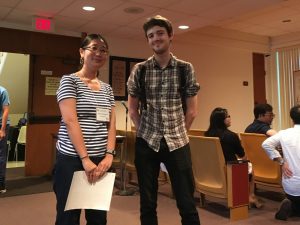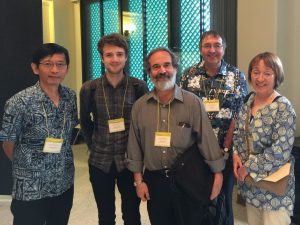ITO, MESTER, KALIVODA, AND HIRAYAMA AT JAPANESE/KOREAN LINGUISTICS CONFERENCE
Several UCSC linguists flew into Hawaii for the 25th Japanese/Korean Linguistics Conference. The Accent Research Group — Junko Ito, Armin Mester, Nick Kalivoda and Jeff Adler (in absentia) — presented their work (with a talk and poster) on the endangered Japanese dialects of Kagoshima at the satellite workshop on prosody and prosodic interfaces. They met up with familiar Santa Cruz-related folks — Haruo Kubozono (NINJAL), former LRC visitor and workshop organizer, and Larry Hyman (UCB), the workshop commentator. Kohei Nishimura, former LRC visiting graduate student also gave a talk based on the NINJAL corpus of Spoken Japanese. At the main conference, they were joined by Hitomi Hirayama, who gave both a poster on “Discourse effects of biased questions in Japanese” at the main session and a talk (joint with Adrian Brasoveanu) at an East Asian Psycholinguistics satellite workshop on “Expressing ignorance in Japanese: contrastive wa vs. sukunakutomo.”
Pictured above: Hitomi Hirayama, Nick Kalivoda
Pictured above: Haruo Kubozono, Nick Kalivoda, Larry Hyman, Armin Mester, Junko Ito

